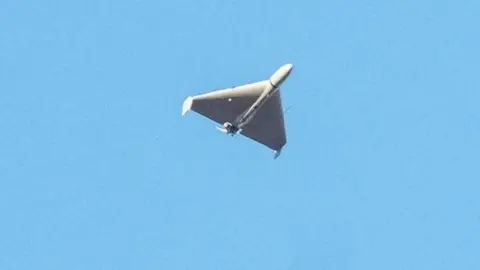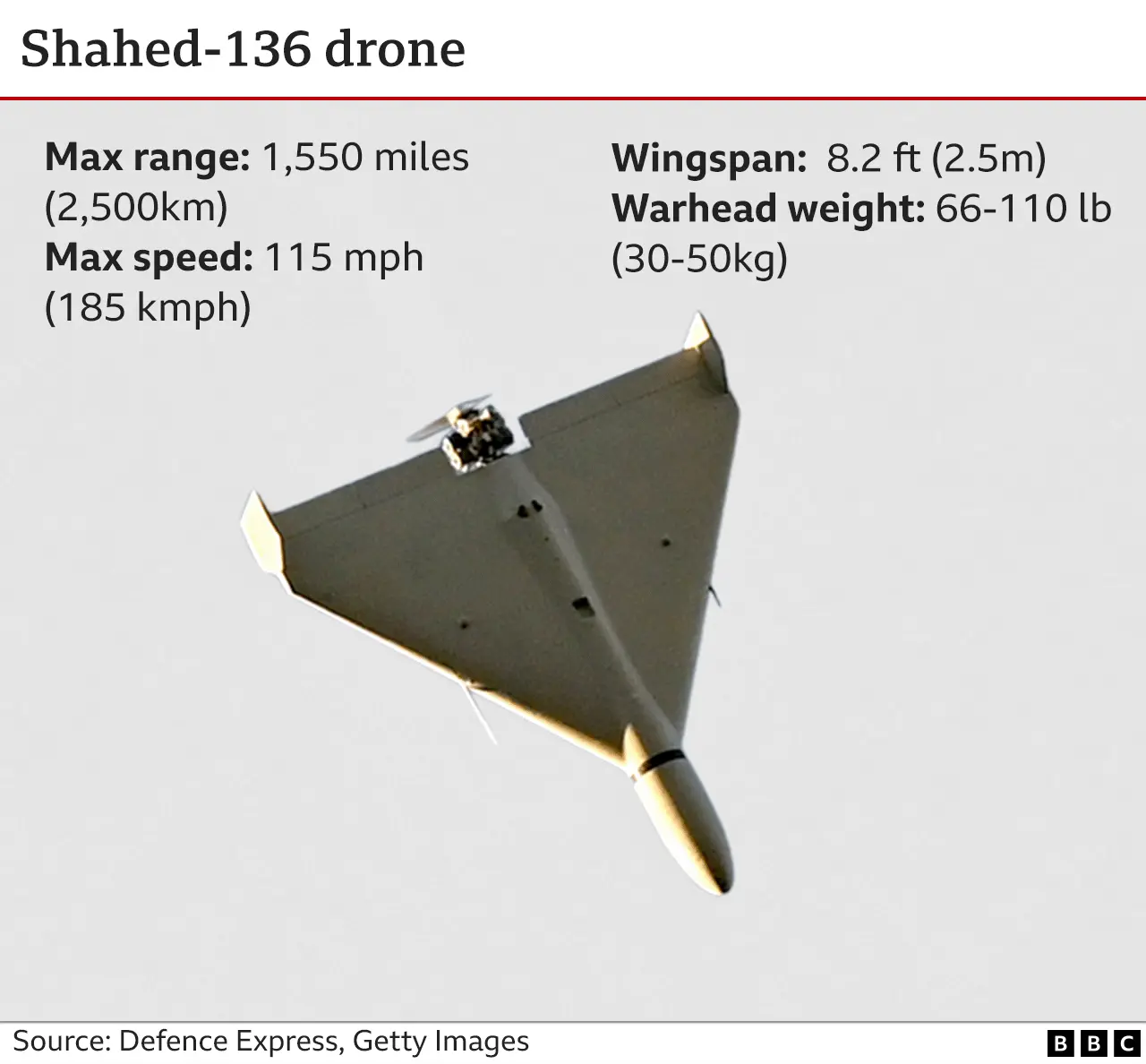Ukraine war: Zelensky accuses Iran of lying over Russia support
 Reuters
ReutersUkraine President Volodymyr Zelensky has accused Iran of "lying" and "terrorist cooperation" by supporting Russia's war in Ukraine.
It comes after Iran admitted for the first time it had supplied drones to Moscow, but only before the invasion.
The West believes Russia has used Iranian "kamikaze" drones to hit key infrastructure sites in Ukraine, but Iran and Moscow previously denied it.
Blackouts have hit much of Ukraine after the attacks on power stations.
Western officials have accused Iran of supplying drones to Russia and of providing personnel on the ground to train Russian drone pilots.
Previously, Tehran denied the accusations, but on Saturday Iran's foreign minister said a small number of the vehicles had been sent to Moscow.
"We provided a limited number of drones to Russia many months prior to the Ukraine war," Hossein Amir-Abdollahian told reporters in Tehran.
However, in an address on his Telegram channel, President Zelensky accused Iran of lying "even in this confession".
The 44-year-old claimed that Ukraine was shooting down about 10 Iranian drones every day, despite Iran saying it had only supplied Russia with a small number.
Mr Zelensky warned Iran about its support for Russia, saying this would backfire.
"We know for sure that Iranian instructors taught Russian terrorists how to use drones, and Tehran is generally silent about it.
"And if Iran continues lying about the obvious, it means that the world will make even more efforts to investigate the terrorist cooperation between the Russian and Iranian regimes and what Russia is paying Iran for such cooperation.
"There will be no such thing in the modern world that any of the terrorists or their accomplices will remain unpunished."
The US, EU and UK have all imposed sanctions on Iran for supplying drones to Russia for use in the conflict.
Russia has used the "kamikaze" drones - named after the Japanese suicide pilots in World War Two because they get destroyed on impact - to hit critical infrastructure sites across Ukraine.
As a consequence, rolling blackouts and restrictions on electricity use have been imposed just as the weather turns cold for winter.
Some Western leaders have called the attacks "war crimes", because under the Geneva Conventions - which define the rules of war - civilian infrastructure cannot be deliberately targeted.
On Saturday, Ukraine's national grid operator imposed further restrictions in some regions because electricity usage had grown compared to the same time last week.

In other news:
Power restored to nuclear plant
Two days after Ukraine's Zaporizhzhia nuclear power plant was disconnected from the power grid following shelling, the supply has been restored, the UN's nuclear watchdog has said.
The plant, seized by Russia in March, has emergency diesel generators to drive the reactors which keep the fuel inside cool and prevent a nuclear meltdown, should it become disconnected from the power grid. It is thought there is around two weeks' worth of diesel at the plant.
After confirming the connections had been repaired and restored, Rafael Mariano Grossi, director general of the International Atomic Energy Agency, reiterated his call for a nuclear safety and security protection zone around the plant to prevent a nuclear accident, saying: "We can't afford to lose any more time. We must act before it is too late."
Both sides accuse the other of shelling the plant.
Nato expansion
Sweden's new government will distance itself from the Kurdish YPG militia as it tries to win Turkey's approval to join Nato, Sweden's foreign minister, Tobias Billstrom, told Swedish Radio on Saturday.
Turkey considers the Syrian Kurdish YPG militia and its political branch PYD to be extensions of the Kurdistan Workers Party (PKK), which launched an insurgency against Turkey in 1980 and is regarded as a terrorist group by Turkey, the United States and the European Union.
Sweden, the US and other Nato countries have supported the YPG in the fight against the Islamic State group.
However, Turkey has vowed to block Sweden's application to join Nato if it does not stop supporting the militia group.
Russian-appointed judge shot
A judge in occupied Ukraine has been shot and badly injured, in what appears to be an assassination attempt.
He has been named as Alexander Nikulin - who worked at the Russian-backed supreme court in the self-proclaimed People's Republic of Donetsk.
In June, he sentenced to death two Britons and a Moroccan, who had been captured while fighting in the Ukrainian army.
Aiden Aslin, Shaun Pinner and Brahim Saadoun were later released in a prisoner swap.
There have been a number of attacks on people working with the pro-Moscow authorities, with several of them killed.
Russia struggles to train conscripts
Britain's Ministry of Defence said that more than 300,000 Russian conscripts in Ukraine will have little impact on the war because Moscow is struggling to train them.
UK intelligence points out that many experienced Russian officers are either fighting, or dead, and there's a shortage of munition and facilities.
It says the conscripts will not offer Russia much help in its "offensive combat capability".
During a speech on Friday, Russian President Vladimir Putin said nearly 50,000 new recruits were already fighting in Ukraine.
